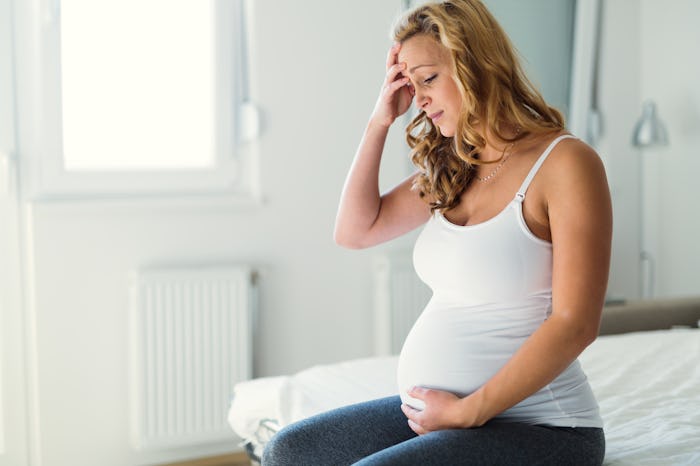Life

5 Early Signs Your Third Trimester Is Going To Be Brutal, So You Can Prepare Now
The second trimester may be called the "Golden Trimester," but no such name is given to the third trimester, and there's a reason for that. Even for women who claim to have an easy third trimester, there's still the waddling and the fact that you can no longer see your feet. But for those who have difficult third trimesters, those weeks can feel truly endless. Luckily, there are some early signs the third trimester is going to be rough, so you can prepare for the grueling weeks ahead.
With my second pregnancy, I had some cervical changes than my OB was concerned with so I was put on "modified bed rest." That term might sound official, but I found it extremely vague. I was supposed to scale back my activity and not lift anything (almost impossible with a 2-year-old). Any time I did even basic things — like taking the subway to work — I feared that I was overdoing it. Because of the ambiguity that comes with modified bed rest, I was utterly terrified throughout most of my third trimester that I would do something to cause preterm labor. Every day that passed, I was relieved that I was one step closer to my due date. It took a real toll on me mentally.
In the end, I made it to 38 weeks and all was fine, but it was a trying time to say the least. Here are five more signs that you might be in for a tough third trimester, though it's important to note that every pregnancy is different. If you feel like something isn't quite right, it's always best to consult your OB.
1High Blood Pressure
If you go in for a routine check-up and your OB says you have high blood pressure — or hypertension — there's a chance that it could lead to a more serious condition called preeclampsia, according to Mayo Clinic.
"Preeclampsia occurs when hypertension develops after 20 weeks of pregnancy, and is associated with signs of damage to other organ systems, including the kidneys, liver, blood or brain. Untreated preeclampsia can lead to serious — even fatal — complications for mother and baby, including development of seizures," explained Mayo Clinic.
So what are some signs to watch for if you're at risk of preeclampsia? The March of Dimes advises that you see your doctor right away if you have blurred vision, swelling in your hands and face, severe headaches, or belly pain.
2Spotting Or Bleeding
Spotting during your first trimester is generally nothing to worry about, and in fact, 20 percent of pregnant women have some bleeding during the first 12 weeks, according to WebMD.
However, if you have spotting or bleeding in your second or third trimester, you'll want to see your OB asap. "When spotting or bleeding is accompanied by contractions or cramping, it can be an indication of cervical dilation and labor," noted Emily L. Balanky, MD, of North Florida OB-GYN, in a paper on second and third trimester bleeding.
Second and third trimester bleeding can also be an indicator of two other pregnancy complications — placenta previa, which occurs when the placenta lies over the cervix, and placental abruption, which occurs when the placenta begins to separate from the wall of the uterus prematurely (prior to delivery of the baby), according to Dr. Balanky. "Any bleeding should be addressed with your obstetrician," she advised.
3Extreme Thirst
When you're pregnant, it's not uncommon to want to chug water, but if you're experiencing excessive thirst, it could be a symptom of gestational diabetes, according to Medicine Net. Pregnant women are screened for gestational diabetes, often at 24 and 28 weeks.
If you are diagnosed with gestational diabetes, your treatment plan will depend on your blood sugar levels, and may range from eating healthy and exercising regularly to administering insulin injections, according to Healthline.
4"Cyclical" Lower Back Aches
When your belly grows, it's totally normal to experience new aches and pains, and your lower back seems to be a particularly susceptible area. However, if you're experiencing lower back aches along with other symptoms, it may be a red flag, according to Mary Rosser, M.D., Ph.D., an ob-gyn at the Montefiore Medical Center, in an interview with Parents.
One of the biggest concerns when this occurs is preterm labor, so it's important to "watch for pain that is 'new' and 'cyclical,' which could be a sign of uterine contractions, along with vaginal bleeding or any change in vaginal discharge that could indicate a placental issue or an early rupture of your waters," advised Dr. Rosser to Parents.
5Nausea
If you're lucky, your morning sickness is limited to the first trimester, but there are a small number of unlucky mamas that experience nausea throughout their entire pregnancy, according to Baby Center.
While unrelenting nausea is typically just a pain for the mama, there are some cases where it can affect the pregnancy. "Severe and prolonged vomiting has been linked to a greater risk of preterm birth, low birth weight, and newborns who are small for their gestational age," explained Baby Center.
However, according to a large study of pregnant women who were hospitalized for severe vomiting, "those who were able to gain at least 15 pounds during their pregnancy had outcomes that were no worse than other women," reported Baby Center.